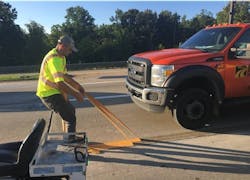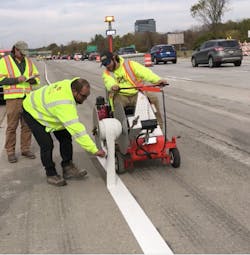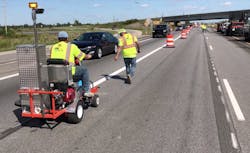For pavement marking contractors, peeling up temporary tape in construction zones is a notoriously difficult and painstaking job, and often puts them into a situation where they are exposed to live traffic. A couple of years ago, PK Contracting set out to make this process easier for their workers after an employee survey confirmed peeling up tape is the worst part of their job.
The company, based in Troy, Michigan, first tried building a machine that would peel up temporary tape, but found that while it helped, the tape on the market still proved difficult to remove.
“The problem was that the tapes that were available on the market from all the suppliers did a great job of going down, but if the job was any length of time, they were very difficult to peel up and the tape would break apart,” said Chris Shea, CEO of PK Contracting.
Fast forward to today, and a pilot project coordinated between PK Contracting, the Michigan Department of Transportation (MDOT) and 3M has successfully produced promising results with a new easier-to-peel tape that’s now in final testing stages.
A Pilot Project Comes Together
After realizing the need for a more durable temporary tape product, PK Contracting reached out to 3M and asked about the possibility of manufacturing a stronger tape that wouldn’t break apart when removing from the roadway, either mechanically or by hand. 3M quickly got to work creating some samples of materials to test, one of which Shea said looked very promising. “We thought, we’ve got a potential home run here,” he said.
In January 2019, Shea and his brother Jim Shea, founder of PK Contracting, met with MDOT director Paul Ajegba to discuss a possible pilot project to test this new 3M Tape along with others to see if they would be a good fit to add to Michigan’s Qualified Product List. With a dedication to innovation, worker safety and improving working conditions, Ajegba gave the pilot the green light and it was soon under way.
Involved from the start were Chris Brookes, Work Zone Delivery Engineer for MDOT and Chuck Bergmann, MDOT Work Zone Technician. Their forward-thinking approach to traffic safety initiatives meant they both understood the need to move the pilot project along quickly given the potential benefits to workers and motorists.
Beginning in July 2019, the pilot project was held on I-94 by the Detroit Metropolitan Wayne County Airport Metro Airport, where a number of bridges needed decks and joints rehabilitated. A multitude of traffic switches would be needed on both concrete and asphalt over the course of the construction project, making it the perfect site for product testing. 3M and another manufacturer supplied their existing QPL products and a new, 3M version for testing.
Gathering Results
Between the six bridges and shifting traffic lanes, the pilot project offered 24 spots to test the tapes. The 4-inch wide tapes were applied, side-by-side in differing combinations to create 8-inch wide traffic lane lines. After six to eight weeks, the tape would be peeled up and monitored for tearing and ease of removal. Shea said the results were as he predicted—the existing QPL tapes proved difficult to peel, while the new 3M tape came up easily and intact.
“There was virtually zero breakage of the 3M Tape, and with the machines that we had built to mechanically peel the tape, we were able to peel the tape up at a rate of about three miles an hour,” he said.
Officials from MDOT agreed. Bergmann said the DOT’s findings showed that work zone teams were able to peel up the 3M Tape about four times faster than before.
In addition, Brookes shared that along with this drastic improvement, he was struck by the increased cleanliness of the operation. Rather than slowly peeling up bits of tape while on their hands and knees, workers were able to seamlessly peel up rolls of tape for a safer and more efficient process.
After the results of the pilot project proved successful, MDOT required the use of the new 3M Tape on freeway projects for the 2020 construction season. Over the course of the year, Shea says the amount of time saved from the new 3M tape would be in the thousands of man hours.
A Win-Win for Workers and Motorists
After months of using 3M’s Tape, Shea says his employees couldn’t be happier with the improved removability, making their job smoother. He shares that one of his employees joked that the improved 3M Tape and the peeling machine are the two greatest inventions in the history of mankind. While that comment was tongue-in-cheek, Shea says in his mind, the success of this pilot project is really an irrefutable win-win for all parties.
“This to me is an absolute no-brainer product that should be the standard across the country or any place in the world that uses temporary tape to facilitate switching of traffic,” Shea said.
Along with the saved time and reduced exposure to traffic for workers, this new 3M Tape also offers benefits to the motoring public. The tape provides a constantly visible marking during the entire construction process no matter time of day, even in less than ideal weather. It also offers improved safety compared to paint, which, when used for temporary lane markings, can leave long-lasting ghost lines on the road that are aesthetically unappealing and pose a safety hazard.
Additionally, speedy tape removal can reduce lane closures and exposure to work zone congestion for the motoring public. A reduction in queueing and traffic delays—which can be some of the main causes of work zone crashes—ultimately results in improved safety for motorists, plus money saved on lane closures.
For MDOT, this pilot project is another step in its goal “Toward Zero Deaths,” which Brookes says is a job that is never done.
“We're always looking to improve,” he said. “It really helps to have industry partners that are willing and trying to do the same thing: to move that needle forward for safety.”
Learn more about high performance pavement markings from 3M.


